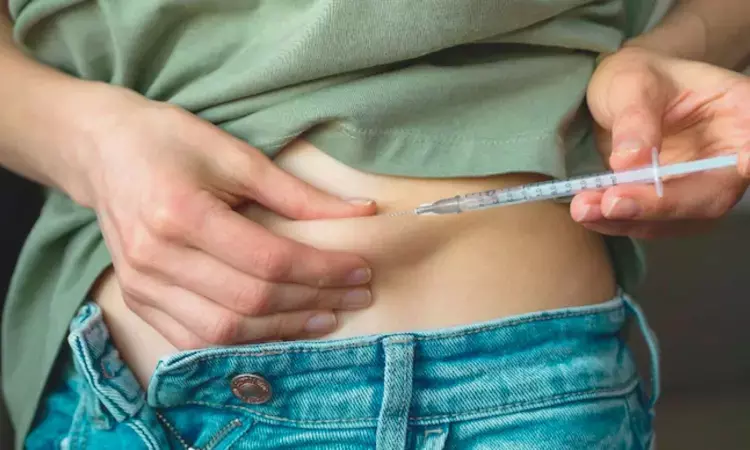- Home
- Medical news & Guidelines
- Anesthesiology
- Cardiology and CTVS
- Critical Care
- Dentistry
- Dermatology
- Diabetes and Endocrinology
- ENT
- Gastroenterology
- Medicine
- Nephrology
- Neurology
- Obstretics-Gynaecology
- Oncology
- Ophthalmology
- Orthopaedics
- Pediatrics-Neonatology
- Psychiatry
- Pulmonology
- Radiology
- Surgery
- Urology
- Laboratory Medicine
- Diet
- Nursing
- Paramedical
- Physiotherapy
- Health news
- Fact Check
- Bone Health Fact Check
- Brain Health Fact Check
- Cancer Related Fact Check
- Child Care Fact Check
- Dental and oral health fact check
- Diabetes and metabolic health fact check
- Diet and Nutrition Fact Check
- Eye and ENT Care Fact Check
- Fitness fact check
- Gut health fact check
- Heart health fact check
- Kidney health fact check
- Medical education fact check
- Men's health fact check
- Respiratory fact check
- Skin and hair care fact check
- Vaccine and Immunization fact check
- Women's health fact check
- AYUSH
- State News
- Andaman and Nicobar Islands
- Andhra Pradesh
- Arunachal Pradesh
- Assam
- Bihar
- Chandigarh
- Chattisgarh
- Dadra and Nagar Haveli
- Daman and Diu
- Delhi
- Goa
- Gujarat
- Haryana
- Himachal Pradesh
- Jammu & Kashmir
- Jharkhand
- Karnataka
- Kerala
- Ladakh
- Lakshadweep
- Madhya Pradesh
- Maharashtra
- Manipur
- Meghalaya
- Mizoram
- Nagaland
- Odisha
- Puducherry
- Punjab
- Rajasthan
- Sikkim
- Tamil Nadu
- Telangana
- Tripura
- Uttar Pradesh
- Uttrakhand
- West Bengal
- Medical Education
- Industry
Once-Weekly Insulin Efsitora Matches Daily Insulin in Type 2 Diabetes Management: NEJM

In the QWINT-1 phase III trial, once-weekly insulin efsitora demonstrated non-inferior efficacy and safety compared to once-daily insulin glargine U100 in insulin-naïve adults with type 2 diabetes. Over 52 weeks, both groups showed similar HbA1c reductions (~8.2% to ~7.05%), with a negligible difference between them (-0.03 percentage points), confirming that weekly dosing may be a viable alternative to daily insulin therapy. The study was published in The New England Journal of Medicine by Julio R. and colleagues.
The trial comprised 795 type 2 diabetes adults who had never been treated with insulin therapy. Participants were randomly assigned in a ratio of 1:1 to receive once-weekly efsitora or once-daily glargine U100. Dosing with efsitora was initiated at a dose of 100 units weekly and could be increased every 4 weeks to fixed doses of 150, 250, or 400 units according to fasting blood glucose. Conversely, glargine dosages were titrated more often, weekly or more frequently, based on a standard titration algorithm to achieve the same glucose targets. The main aim was to measure the 52-week change in HbA1c with a noninferiority margin of 0.4 percentage points.
Results
• The mean baseline HbA1c was 8.20% in the efsitora group and 8.28% in the glargine group.
• At the end of 52 weeks, HbA1c levels were reduced to 7.05% with efsitora and to 7.08% with glargine.
• The least-squares mean change was −1.19 percentage points for efsitora and −1.16 percentage points for glargine.
• The estimated between-group difference of −0.03 percentage points (95% confidence interval: −0.18 to 0.12) established that efsitora was noninferior to glargine.
• Superiority was not shown (P=0.68). Efsitora also had benefits regarding safety and ease of use.
• The incidence of clinically significant or severe hypoglycemia was less with efsitora (0.50 events per participant-year) than with glargine (0.88 events per participant-year), with an estimated rate ratio of 0.57 (95% CI: 0.39 to 0.84).
• Furthermore, efsitora patients needed fewer dose adjustments during the year, a median of 2 adjustments versus 8 in the glargine group.
Weekly Dose and Burden of Treatment
• At week 52, the median total weekly insulin dose was 289.1 units with efsitora compared with 332.8 units with glargine, with an estimated between-group difference of −43.7 units per week (95% CI: −62.4 to −25.0).
Weekly efsitora, given as a fixed-dose insulin regimen, was noninferior to daily glargine in lowering HbA1c in adults with type 2 diabetes who had not used insulin before. The results indicate that efsitora could provide an uncomplicated and effective option compared to standard daily insulin regimens, with a lower incidence of hypoglycemia and less need for dose adjustments, potentially enhancing patient adherence and quality of life when treating type 2 diabetes.
Reference:
Rosenstock, J., Bailey, T., Connery, L., Miller, E., Desouza, C., Wang, Q., Leohr, J., Knights, A., Carr, M. C., & Child, C. J. (2025). Weekly fixed-dose insulin efsitora in type 2 diabetes without previous insulin therapy. The New England Journal of Medicine. https://doi.org/10.1056/nejmoa250279
Dr Riya Dave has completed dentistry from Gujarat University in 2022. She is a dentist and accomplished medical and scientific writer known for her commitment to bridging the gap between clinical expertise and accessible healthcare information. She has been actively involved in writing blogs related to health and wellness.
Dr Kamal Kant Kohli-MBBS, DTCD- a chest specialist with more than 30 years of practice and a flair for writing clinical articles, Dr Kamal Kant Kohli joined Medical Dialogues as a Chief Editor of Medical News. Besides writing articles, as an editor, he proofreads and verifies all the medical content published on Medical Dialogues including those coming from journals, studies,medical conferences,guidelines etc. Email: drkohli@medicaldialogues.in. Contact no. 011-43720751


